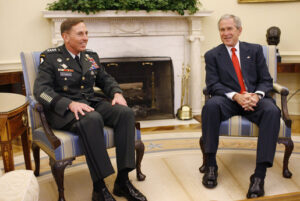Several former U.S. defense secretaries and retired generals recently published an open letter about the current political environment in America. The letter stated, among other things: “Military officers swear an oath to support and defend the Constitution, not an oath of fealty to an individual or to an office.”
That’s just pure nonsense and self-delusion. Oh, sure, technically it’s true that military officers swear such an oath, but they don’t follow it. Instead, they faithfully and blindly follow the orders of the president, which means, as a practical matter, that their oath is one of fealty to the president, not to the Constitution.
Let’s look as some examples:
1. The invasions of Afghanistan and Iraq. Everyone acknowledges that the Constitution requires a congressional declaration of war before the president can wage war through his military forces. Everyone also knows that Congress never declared war on either Afghanistan or Iraq.
That means that when President Bush ordered the invasions of both countries, every single military officer, from general on down, should have said to him, “We have taken an oath to support and defend the Constitution. The Constitution requires a congressional declaration of war. You don’t have that. We cannot and will not obey your order to invade either country.”
But that’s not what happened. Instead, every single military officer, from general on down, faithfully followed the orders of his commander in chief. The military invaded both Afghanistan and Iraq, killed hundreds of thousands of people, and destroyed both countries. In doing so, their loyalty was to the president, not to the Constitution.
2. Torture. The Constitution prohibits the infliction of cruel and unusual punishments. Yet, countless military officers have countenanced, if not supported, the use of torture as part of the so-called global war on terror.
3. Indefinite detention. The Constitution requires a speedy trial for anyone accused of a criminal offense. That includes terrorism, which is a federal criminal offense. Yet, there are men in the U.S. military’s torture and prison camp at Guantanamo Bay, Cuba, who have been incarcerated for 20 years without a trial.
4. Military tribunals. The Constitution guarantees the right of trial by jury in criminal prosecutions. Yet, in terrorism prosecutions at the military’s torture and prison camp at Guantanamo, if terrorism suspects are ever accorded a trial, it will be by military tribunal, which is really nothing more than a kangaroo proceeding in which a verdict of guilt is guaranteed.
In fact, when the military and the CIA were establishing their torture and prison camp at Guantanamo Bay, it was with the precise purpose of avoiding the principles of the Constitution. That’s why they set it up in Cuba rather than the United States. Their aim was to have a Constitution-free zone where they could do whatever they wanted to terrorism suspects. At the risk of belaboring the obvious, that’s a rather unusual position to take for military officers who have sworn an oath to support and defend the Constitution.
In fact, the Constitution established a judicial system in which federal criminal prosecutions would take place, and the manner in which they would be handled. That’s what the Fourth, Fifth, Sixth, and Eighth Amendments are all about. That’s where all, not just some, terrorism prosecutions should be taking place. Instead, the military established its own special judicial system for prosecuting terrorism cases, notwithstanding the fact that nowhere in the Constitution does it authorize the military to establish a separate judicial system for handling terrorism prosecutions.
So, why is it that military officers are so convinced that they are fulfilling their oath to support and defend the Constitution? The president has been democratically elected in accordance with the Constitution. So, when military officers faithfully and loyally obey the orders of the president, in their minds they are supporting and defending the Constitution. They are only fooling themselves. It’s a classic case of self-delusion.




